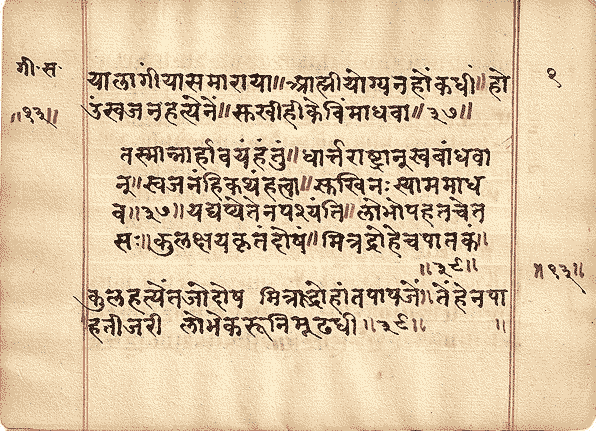
tasmān nārhā vayaṃ hantuṃ dhārtarāṣṭrān sa-bāndhavān
sva-janaṃ hi kathaṃ hatvā sukhinaḥ syāma mādhava
Update RequiredTo play the media you will need to either update your browser to a recent version or update your Flash plugin.
he mādhava (O Mādhava!),
tasmāt (therefore) vayaṁ (we) sa-bāndhavān (along with relatives) dhārtarāṣṭrān (the sons of Dhṛtarāṣṭra) hantuṁ na arhāḥ (we should not kill).
sva-janaṁ hi (because own people) hatvā (after killing),
[
vayam]
(we) kathaṁ (how?) sukhinaḥ (happy men) syāma (we could be).
| tasmāt |
– |
av. – therefore (from: tat sn. 5n.1 m. – from that); |
| na |
– |
av. – not; |
| arhāḥ |
– |
arha 1n.3 m. – who deserve, who ought to (from: √arh – to deserve, to be able to; followed by inf.); |
| vayam |
– |
asmat sn. 1n.3 – we; |
| hantum |
– |
√han (to kill) inf. – to kill; |
| dhārtarāṣṭrān |
– |
dhārtarāṣṭra 2n.3 m. – the sons of Dhṛtarāṣṭra (from: dhṛta-rāṣṭra – by whom the kingdom is held, from: √dhṛ – to hold, PP dhṛta – held; rāṣṭra – kingdom); |
| sa-bāndhavān |
– |
sa-bāndhava 2n.3 m.; BV: ye bāndhavaiḥ saha vartante tān – those who are with their relatives (from: sa – together with, in common, short form of: saha or sama; occurs mostly in compounds, requires instrumental; √bandh – to bind, to fetter, bandhu – connection, relation, kinship, friend, bāndhava – kinsman, friend); |
| sva-janam |
– |
sva-jana 2n.1 m.; TP: svasya janam iti – own people (from: sva – own; √jan – to be born, to produce, jana – man, people, creature); |
| hi |
– |
av. – we could bebecause, just, indeed, surely; |
| katham |
– |
av. – how?, in what manner? |
| hatvā |
– |
√han (to kill) absol. – after killing; |
| sukhinaḥ |
– |
sukhin 1n.3 m. – happy men (from: su – prefix: good, excellent, beautiful, virtuous; kha – cavity, hole, nave; su-kha – joy, happiness, literally: good hole in the nave [of a wheel through which an axis runs] that makes the moving smooth; or from: su-√sthā; opposite to: duḥkha – pain, difficulty); |
| syāma |
– |
√as (to be) Pot. P 3v.3 – we could be; |
| mādhava |
– |
mādhava 8n.1 m. – O descendant of king Madhu (from: madhu – sweetness, honey); or TP: mātur dhava iti – O husband of the Mother Lakṣmī (from: mā – mother, Lakṣmī; dhava – husband); |
sa-bāndhavān → sva-bāndhavān (own relatives);
sva-janaṁ→ sva-janān / sa-janaṁ (own people / being with relatives);
no commentary up to the verse BhG 2.10
no commentary up to the verse BhG 1.47
no commentary up to the verse BhG 2.11
commentary under the verse BhG 1.38
commentary under the verse BhG 1.38
commentary under the verse BhG 1.38

